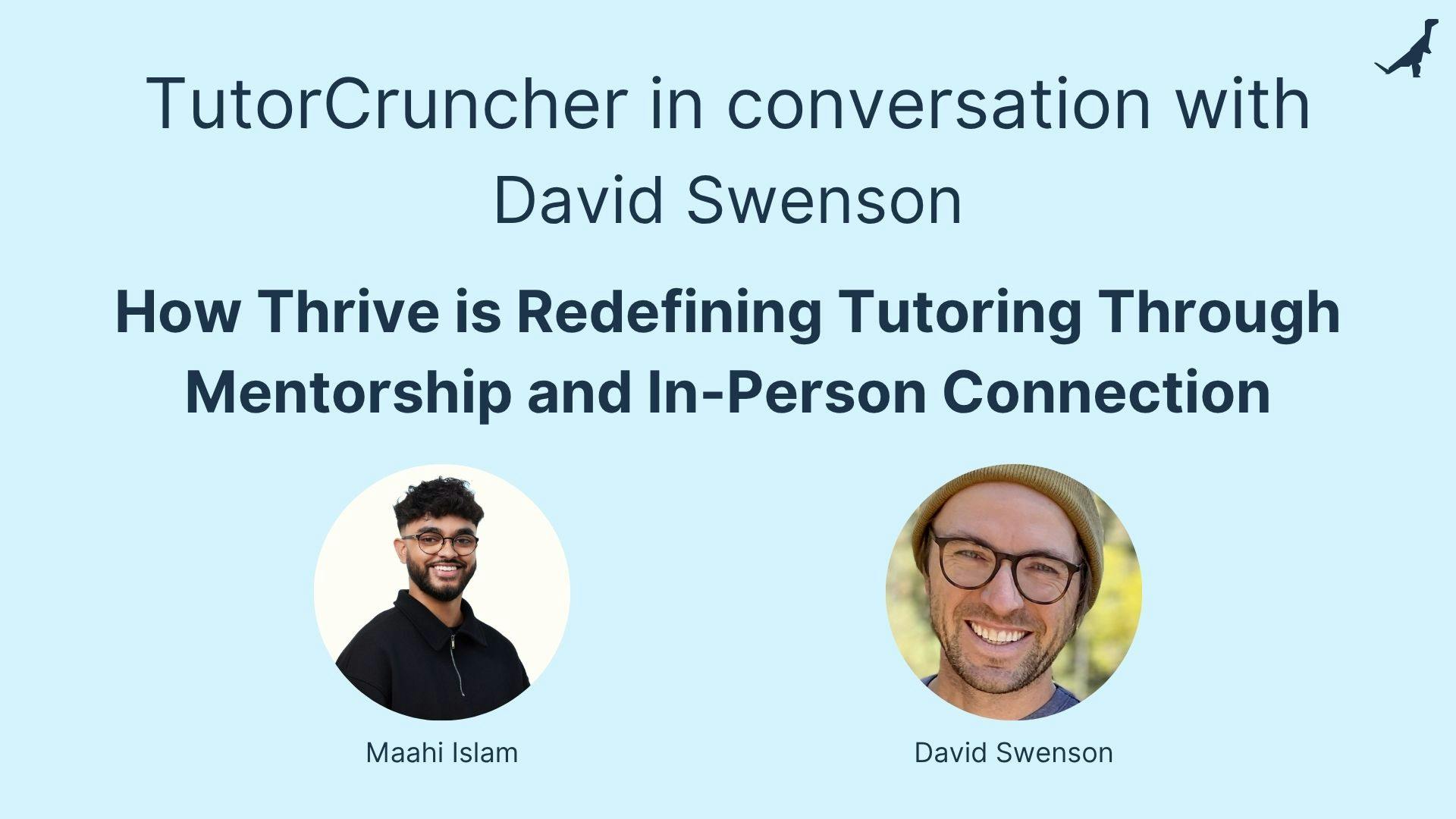Thrive Tutoring Denver isn’t your average tutoring company. Founded by David and Matt, two friends with a background in nonprofit and education work, Thrive has grown into something much deeper than test prep or homework help. Their focus? Building long-lasting relationships that support students not just academically, but personally.
As David puts it:
“What makes us unique is our mentoring culture. Every relationship is deep, authentic, and engaged.”
That one line captures the heart of Thrive: tutoring not as a transaction, but as a vehicle for trust, mentorship, and transformation.
From side hustle to something bigger
Thrive began in a pretty organic way. David and Matt were already known for connecting with students, and families quickly started asking them to tutor. What was at first a few one-off requests slowly grew into a steady stream of referrals.
David laughs when he remembers those early days:
“People will pay us to do this thing we’re good at.”
But while it may have started as a small side hustle, Thrive quickly became more than that. Many of the families coming to them weren’t just looking for help with schoolwork. Some children were facing much deeper challenges — whether academic struggles, mental health issues, or simply a loss of confidence. And over time, David realised that what really made a difference wasn’t drilling equations or editing essays — it was showing up consistently and believing in the student.
“Ultimately … the thing that did it was just the enduring friendship … they realised we actually just believed in them and cared about them and we weren’t going to leave.”
That philosophy of staying the course — of being the person who doesn’t walk away when things get tough — became the DNA of Thrive.
Why in-person tutoring still matters
In today’s post-Covid tutoring world, most companies have leaned heavily into online lessons. Thrive, however, has remained committed to offering primarily in-person tutoring. Not because online isn’t effective, but because they’ve noticed their families crave face-to-face connection — especially for younger students.
“I think we’re still seeing the fatigue of constantly being online … And in general, it aligns with our values and culture of mentoring and relationship building through the vehicle of tutoring.”
This choice is a reflection of Thrive’s ethos: they’re not trying to be the cheapest or fastest tutoring option. They’re trying to be the most human. The small, seemingly insignificant moments — a smile, a side conversation, a story shared in vulnerability — often make the biggest difference. Those moments are harder to replicate through a screen.
Tutoring as mentorship
One of the most striking parts of my conversation with David was how often the word “relationship” came up. Thrive isn’t just about raising grades, it’s about building bonds that sometimes last years. Families know this, and they value it.
David shared a story of a parent who once told a tutor:
“Your relationship with our son means so much to him — it’s really special, and we don’t want to change that by adding his brother into the mix.”
To that family, the tutor wasn’t just helping with schoolwork. They had become someone irreplaceable in their child’s life.
David also shared one of his own favourite stories. A student he worked with had flunked out of seventh grade, lost all confidence, and withdrawn socially. For months, progress was slow. But then something shifted. After David shared a personal story about his own insecurities growing up, the student quietly mirrored him: showing up to a field trip with a new haircut and a t-shirt instead of his usual hoodie.
“I’ll never forget it … it was an artifact, a data point of feedback that this is working. Even if he still fought me sometimes on the academics, there was something deep in his brain that knew this guy cares about me.”
Moments like that are why Thrive tutors often become lifelong mentors. Some students even stay in touch long after graduating, catching up over lunch or seeking advice as young adults.
Building a culture that lasts
This relational approach doesn’t happen by accident. Thrive is intentional about building a culture where tutors aren’t overworked and can really invest in their students. Unlike many companies that pile tutors high with as many clients as possible, Thrive encourages lighter client loads so relationships can stay deep and authentic.
Of course, running a tutoring company at scale requires solid systems — and David admits that in the early years, this was a challenge. He cycled through several software platforms before settling on TutorCruncher.
“I tried seven more platforms, and then I came back to TutorCruncher … I don’t know how we would hold it all together with clarity, transparency, and integrity.”
Having the right infrastructure in place has allowed Thrive to focus on what really matters: finding the right people, mentoring them well, and making sure students are always supported.
Growing steadily, not quickly
Thrive isn’t interested in explosive growth at all costs. Instead, David and Matt want to scale slowly, making sure their systems and culture stay intact along the way.
“We’ve invested a lot of time … so that we could support 150, 250, 500 tutors around the city … but only if the culture and systems stay intact.”
This patience has paid off. Beyond their one-to-one tutoring, Thrive has been invited to partner with schools, libraries, and even behavioural health clinics — a sign that their reputation is spreading across Denver.
As David put it, growth for Thrive isn’t about being everywhere. It’s about being deeply rooted in the communities they serve.
Looking ahead
What sets Thrive apart is that they’ve redefined what tutoring can mean. It’s not just about raising grades or prepping for tests — it’s about relationships that shape confidence, character, and long-term success.
In David’s words:
“We love serving families one-on-one … but it’s also been a real joy and privilege to have institutions call us and say, ‘We’ve heard about your reputation, and we want you here.’”
For Thrive, the future looks steady, relational, and rooted. And if their past stories are anything to go by, they’ll keep proving that the deepest impact often comes not from rushing ahead — but from slowing down, showing up, and sticking around.


